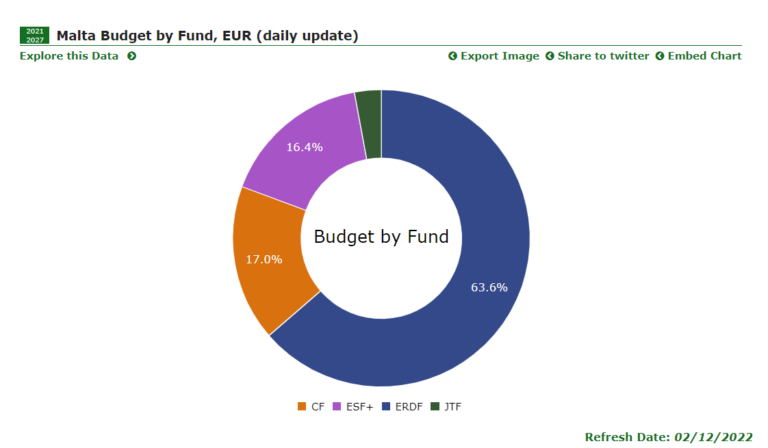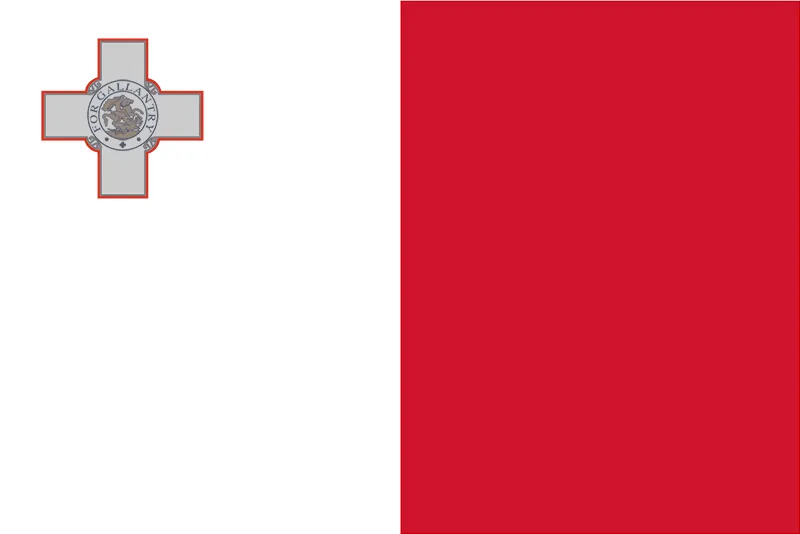1. Background: ESF+ & managing authority
In the 2021 – 2027 ESF+ programme, Malta aims to continue building on the support provided under previous programming periods and to reflect the challenges brought about by the COVID-19 pandemic. The latter has impacted labour market stability and the provision of services in various sectors, including health and education and it has also exposed vulnerable groups including people at risk of poverty to increased socioeconomic risk. Within this context, investment under the ESF+ programme has the objective of strengthening capacities in all sectors falling within the scope of the ESF+ regulation, namely employment, education, health and social sectors, with the objective of improving and adapting services to new and emerging needs. Malta implements the ESF+ via a single national programme.
Malta plans to mobilise its ESF+ resources to target the needs of vulnerable, disadvantaged and marginalised groups in a direct manner, particularly children, persons at risk of poverty, exclusion and material deprivation, persons with a disability, as well as youths and foreign nationals, in order to foster inclusion and integration. The programme will also improve, modernise and increase the accessibility of educational provision, strengthen efforts to retain strong and stable employment levels, as well as promote new employment opportunities, specifically, to reduce the gender pay gap.
The Planning and Priorities Coordination Division (PPCD) is the Managing Authority for European and Structural Investment Funds in Malta. The PPCD is not to be confused with the Funds and Programmes Division (FPD) which is an administrative structure established to handle the management of EU Funds (with the exception of Structural Investment Funds and the Cohesion Fund) and other Funds allocated to Malta.
The PPCD is a Division within the Parliamentary Secretariat for European Funds (MEFL). The Parliamentary Secretariat for European Funds (MEFL) sits within the Ministry for the Economy, European Funds and Lands. As part of its role as an MA, the PPCD also ensures maximum transparency and information in relation to the funds through the organisation of training sessions, information activities and communication with the media, potential applicants for funding and the general public.
Also, within the Parliamentary Secretariat is the Measures and Support Division which exists to ensure the effective administration and implementation of EU funded support measures to Enterprises, through effective liaison with internal and external stakeholders. The Division is mandated to ensure the strategic management, administration and implementation of EU funded measures to support Enterprises (SMEs) by taking up the function of ‘Intermediate Body’ for measures funded through the European Regional Development Fund (ERDF), and acting as the National Contact Point (NCP) for the implementation of aid measures funded through the Structural Funds.
To address the communication gap on EU funding, the Servizzi Ewropej f’Malta (SEM) was created to provide outreach activities on EU policies and strategies and to provide assistance in the application and implementation of EU-funded projects. The name of the agency reflects its mission and functions, namely to serve as a “gateway” to EU related services in Malta and Gozo, making it easier for citizens to reap the benefits of EU membership.
2. PARTNERSHIP AGREEMENT: MALTA 2021-2027
2.1 Summary of PA Priorities
Malta will benefit from €817 million in Cohesion Policy funding in 2021-2027 to support the sustainable development of its economy as set out in the Partnership Agreement adopted with the Commission. Cohesion Policy investments will further contribute to address the disparities in the country and make the Maltese economy more innovative and competitive. EU funds will support the country’s green transition and energy security and its digital transformation. It will improve people’s skills, employment and social inclusion.
Malta’s Partnership Agreement (PA) defines the policy choices for ESF+, ERDF, CF, JTF, and EMFAF and sets out how these choices will contribute towards the achievement of the country’s socio-economic goals (outlined below) within the following policy objective areas:
- Objective 1: A more competitive and smarter Europe by promoting innovative and smart economic transformation and regional ICT connectivity
- Objective 2: A greener, low-carbon transitioning towards a net zero carbon economy and resilient Europe by promoting clean and fair energy transition, green and blue investment, the circular economy, climate change mitigation and adaptation risk prevention and management, and sustainable urban mobility
- Objective 3: A more connected Europe by enhancing mobility
- Objective 4: A more social and inclusive Europe implementing the European Pillar of Social Rights
- Objective 5: A Europe closer to citizens by fostering the sustainable and integrated development of all types of territories and local initiatives
- Objective 6: Enabling regions and people to address the social, employment, economic and environmental impacts of the transition towards the Union’s 2030 targets for energy and climate and a climateneutral economy of the Union by 2050, based on the Paris Agreement.
Consultations on how EU Funds 2021-2027 can contribute to Malta’s needs were undertaken in 2020 whereby a series of thematic and territorial committee meetings were held. Key stakeholders included Government entities, relevant bodies representing civil society and social partners and environmental partners, amongst others. A consultation exercise on the ESIF programmes was carried out with the Malta Council for Economic and Social Development, in addition to various wide public consultations launched for the Programmes in 2021.
2.2 Total budget by fund and theme


2.3 Summary of investment plans
Green transition, energy security and competitiveness
€417 million from the European Regional and Development Fund (ERDF) and the Cohesion Fund will contribute to make small and medium businesses become more innovative, digital and competitive, and boost a smarter and low carbon economy.
An important share of the funds will be invested in ensuring energy efficiency and energy storage capacity in the country thanks to the development of a second electricity interconnector to Italy in the form of a high-voltage cable running under the sea. This will increase electricity supply and security and help reduce greenhouse gas emissions.
Moreover, €23.3 million from the Just Transition Fund (JTF) will be invested in electricity power supplies to help decarbonizing the Grand Harbour and Malta Freeport.
An inclusive labour market, education and healthcare
Young people and women will have better access to employment thanks to over €124.4 million under the European Social Fund Plus (ESF+). This fund will also support innovative teaching methods and learning tools, inclusive education for vulnerable groups, such as children with disabilities, and education in the green and digital transition fields.
Moreover, Malta will support active inclusion, equal opportunities and non-discrimination of disadvantaged groups, such as persons with disabilities. Food aid will also be offered to the most deprived. In addition, Malta will invest in its health systems, by providing training to workers in healthcare, social protection and care, rolling out awareness-raising campaigns on healthy lifestyles and wellbeing, and investing in health research.
Sustainable fishery
€21.8 million from the European Maritime, Fisheries and Aquaculture Fund (EMFAF) will foster the growth of a sustainable blue economy, improve the resilience of the fisheries sector, and facilitate the sector’s green transition by restoring and conserving aquatic biological resources and promoting sustainable aquaculture.
3. MALTA’S PRIORITIES
3.1 Development challenges and opportunities for malta
Malta is one of the most densely populated MS within the EU. Population density is ever-increasing as more economic migrants are settling in Malta. In addition, the heavy increase in inbound tourism experienced in Malta since 2014 is another important factor impinging on the country’s economy; increasing the pressure on its environment, infrastructure and services. Malta has a predominantly ageing population on the one hand but, on the other hand, the number of children and youngsters has decreased, with Malta registering one of the lowest fertility rates in Europe.
In line with worldwide trends, inbound tourism has suffered a significant setback due to the COVID-19 pandemic. The pandemic has had an unprecedented impact on the Maltese economy and its public finances. This required Government intervention to support the economy and ensure that the crisis does not result in long lasting damage to the country’s financial sustainability. The measures introduced by Government in response to the pandemic, together with the resilience of the labour market ensured that high levels of employment were retained.
3.2 Socioeconomic Needs
Labour market
The performance of the Maltese labour market has experienced significant growth over the past years, with increasing employment rates and low unemployment rates. The links between gender and specific types of economic activity is still evident. Employment levels by males is predominant in most economic activities with a high prevalence in manufacturing and construction. Female employment registers higher in finance and insurance; education; and human health and social work. Employment in Gozo increased between 2009-2019; with the highest share of employees working in market services. Similarly, the level of jobseekers decreased in the past years. The latest economic projections produced by the Ministry for Finance and Employment suggest that the Maltese economy is expected to resume its positive performance and growth.
Employment rates and gender
In 2019, Malta had the highest gender employment gap in the EU-27. In fact in 2019, male employment was 7.5% higher than the EU-27 average, while female employment was 1.5% lower. The Government’s free childcare scheme, which provides free childcare services to parents/guardians who are either gainfully employed or are still pursuing an education, together with other ‘making work pay’ initiatives, has served as an important contributor towards the increase in female employment rates. Although the greatest gender pay gap is observed in the 65+ age bracket, it is still noticeably high in other age groups. With regards to self-employment, the female component remains comparatively low. There is therefore scope for further efforts to promote self-employment and sustain the increasing growth of female persons in employment.
Youth employment and elderly participation in the labor market
Malta has registered considerable improvements about youths not in employment, education, or training. In this regard, the Youth Guarantee Scheme, launched in 2016, has contributed towards improved employment rates for youths through the provision of good quality opportunities in education, traineeships, or employment. Nevertheless, Malta’s efforts to ensure increases in youth employment and decreases in the respective unemployment, need to be sustained in line with the new Youth Employment Policy that is currently being developed.
The Mature Workers Scheme, launched in 2014, is directed towards employers recruiting personnel aged 45-65 who have been registering for work. Although the activity rate for the 55-64 age group has increased since then, the local average is still significantly lower than the EU-27 average. In this regard, sustaining and increasing employment participation rates for different target groups, especially in terms of female employment and the elderly, remains important.
3.3 Social cohesion, poverty & material deprivation
Malta has implemented several actions to address its EU 2020 target to lift 6,500 people out of poverty, including further investment in education as a key to social mobility, the exemption of income tax for low income earners, in-work benefits, and free childcare services, amongst others. In 2016, Government launched a measure whereby employers who employ more than 20 people are required to include persons with a disability, amounting to at least 2% of the total workforce. This measure has contributed towards the decrease in people with disability registering for benefits. By 2019, the at-risk-of-poverty and social exclusion rate, which is one of the multidimensional poverty criteria towards sustainable development, had declined.
Nonetheless, the unemployed in Malta experience a high at-risk-of-poverty and social exclusion. Age and sex variants impinge on the rate of poverty and material deprivation. Across different age cohorts, females are more susceptible to being at-risk-of-poverty and social exclusion, with the lowest rates registered for under 16 years, and the highest for 55+ years. These trends, however, are noticeable across both genders. This suggests a link with variables related to work and employment, such as being part of the labour force and being of employment age. Furthermore, low education levels experience higher at-risk-of-poverty and social exclusion rate. In 2019, adults with lower education level attainments were at the highest at-risk-of-poverty and social exclusion, with females at a higher risk (31.9%) than their male counterparts (24.5%). Moreover, the higher the attainment levels of parents, the less is the likelihood that the child will face poverty and social exclusion. In this regard, further development of the education sector is a necessary investment for enhanced inclusion, as well as social integration.
The percentage of people with disability (16+) struggling to meet their housing payments in Malta stood at 4.0%, compared to the 3.3% of persons without a disability. With regard to poverty variations between districts, in the Southern Harbour, Gozo and Comino the level of spending was below the national average line in 2015. In this regard, addressing the specific needs of vulnerable groups remains necessary to enable Malta to move towards a more inclusive society.
Regarding severe material deprivation, which is one of the multidimensional poverty criteria towards sustainable development, Malta’s rate was lower than the EU-27 average. Moreover, females in Malta registered a higher deprivation rate than their male counterparts. In 2019, 5.9% of the population could not afford an everyday meal with protein or vegetables. Food deprivation has severe and broad implications across all age groups. These include: medical, social and economic problems which might hinder educational achievements as well as attaining and retaining a job that discourages dependency on welfare schemes and enables a better quality of life. Additional initiatives are therefore necessary to ensure the sustainable integration of persons suffering from material deprivation into society and to ensure basic livelihood and wellbeing.
Over recent years, the percentage of foreign nationals in Malta has increased exponentially. In 2018, the amount of employed foreign nationals in Malta and Gozo amounted to 67,596 persons, with almost 53% from EU member states, 46% third country nationals (TCNs) and 1% from EFTA countries. Although wages, income and living conditions of TCNs in Malta, including disposable income, education and employment opportunities, and housing, are found to be more favourable than in other EU countries, those employed in sectors such as construction and tourism are associated with relative poverty. Additional initiatives are therefore necessary to ensure the sustainable integration of persons suffering from material deprivation into society and to ensure basic livelihood and wellbeing.
3.4 Education and training
Malta’s demographic growth is expected to continue in the next decade resulting in the enhanced need for increased, digitalised and labour market relevant provision of schooling, in order to sustain Malta’s economy as well as continue fostering a culture of education and lifelong learning (LLL). In 2019, the ESL rate in Malta was still lagging behind the EU-27. Several actions have been launched, including the mainstreaming of vocational and applied subjects within the lower secondary school system, referred to as the ‘My Journey’ Reform, aiming at reducing dropout rates through different pedagogies in compulsory schooling. Concurrently, the introduction of new revised syllabi has also contributed towards positive trends in this area. Engagement at primary level was further enhanced through the introduction of digital technologies and e-content. A targeted approach towards primary students with low literacy skills was also supported through out-of-class sessions during school hours. However, additional support for young persons to obtain the necessary skills to enter and move within the labour market and to continue pursuing further education remain vital.
The provision of quality and recognised VET programmes in Malta has changed the education landscape dramatically and has given alternative options for young people. Tertiary educational attainment has also improved considerably over recent years. Participation in credit mobility programmes requires further improvement, in this regard, and despite the progress achieved, more efforts are needed to improve access and quality of FHE. With respect to persons with disability, in Malta there are limited specific education support programmes after the compulsory schooling age is surpassed. Adult Learning In Malta, adult learning and participation rates in education and training registered increases but, on the other hand, in 2019, Malta had the 2nd highest percentage of adults with lower secondary education. To this end, support to improve the skills of low skilled adults remains important, as also outlined in the Country Report for Malta (2020).
Despite the expansion of the labour force in recent years, ensuring that employers can retrain and retain skilled workers is of utmost importance. Furthermore, an increase in researchers and human capital capable of initiating and directing research initiatives is dependent on an education system which fosters transversal skills of creativity, critical thinking, productivity, and problem-solving. Improving the learning journey through a more student-centred pedagogy for the provision of quality education and addressing labour market skills gaps is therefore important.
The European Green Deal is also expected to have an impact on the employment market and the required skills. Eurostat reports that ‘Employment in environmental goods and services sector’ are limited for Malta, however, it also indicates a percentage increase in this sector between 2014-2016. Having the right skills is critical to make the transition to a low-carbon economy, with the emphasis placed on improving current skills and training to provide new green skills. A growing low carbon economy can only flourish if employees have the right skills to meet the demands that the industry will face in future.
3.5 Strategy and complementarity
Investments supported under the ESF+ shall particularly aim to foster an inclusive social environment in line with the European Pillar of Social Rights, foster an environment conducive to a healthy labour workforce and sustain a new generation of quality education provision, whilst addressing the challenges faced by the current low-skilled adult population. The ESF+ Programme will also aim to address territorial disparities between Malta and Gozo. Building on previous programming periods, Government remains committed to earmarking for Gozo at least 10% of the ESF+ Programme. These initiatives will particularly complement the horizontal and specifically targeted investments in Gozo to be supported under European Regional Development Fund (ERDF).
ESF+ measures will act as the main fund providing education and training as well as inclusion measures. ESF+ measures will therefore complement ERDF interventions, primarily under the innovative and smart dimension and social dimension, and Recovery and Resilience Plan (RRP) investments, in terms of providing the necessary combination of infrastructure and skills to enable jobs and growth; access to and improved education, health and social services, R&I and entrepreneurship; the digital transition, together with measures to foster inclusion. Furthermore, it will also complement interventions under the greener, lowcarbon dimension of the ERDF and Cohesion Fund (CF), the Just Transition Fund (JTF) and RRP investments in terms of providing training, reskilling opportunities and pedagogies towards a green economy. ESF+ resources will also complement cross-border and transnational programmes in areas related to green and digital cooperation, as well as the social dimension.
In addition, ESF+ interventions will complement interventions under Asylum, Migration and Integration Fund: whereby the migration fund will target the integration of migrants and TCNs at reception stage, whilst the ESF+ will focus on the longer-term integration and inclusiveness of various vulnerable target groups, including TCNs. The delineation of interventions under these two funding instruments will ensure that EU funds will continue to be maximised in this area.
Interventions undertaken under the ESF+ will also seek to complement Malta’s priorities in respect of the Common Agricultural Policy Strategic Plan (CAP SP) and European Maritime, Fisheries and Aquaculture Fund (EMFAF) Programmes. Complementary actions are envisaged in the promotion of research and training in fisheries, aquaculture, agriculture, and rural development. In addition, Government will seek to maximise the potential synergies with other initiatives such as ERASMUS+ in terms of mobility and the European Globalisation Adjustment Fund for Displaced Workers (EGF) in relation to unexpected restructuring events which might impact employment in a significant manner. Whilst support under the Technical Support Instrument (TSI) will be sought as the main source for supporting reforms and capacity building, complementarities with ESF+ are also envisaged in terms of the implementation of measures that may emanate from TSI projects.
Co-funded by the European Union. Views and opinions expressed are however those of the author(s) only and do not necessarily reflect those of the European Union. Neither the European Union nor the granting authority can be held responsible for them.




